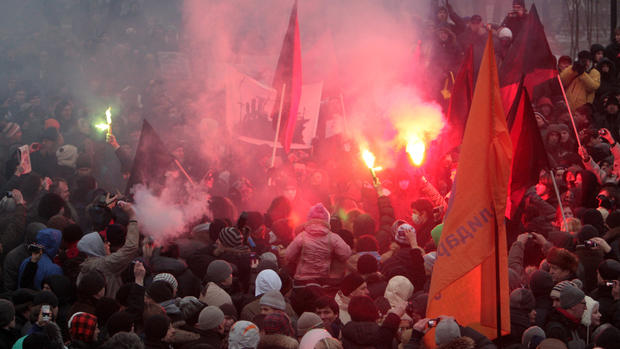Day of massive protests in Russia
Updated 1:55 p.m. ET
MOSCOW - Tens of thousands of Muscovites thronged to a square across the river from the Kremlin on Saturday to protest alleged electoral fraud and urge an end to Prime Minister Vladimir Putin's rule, demands repeated at other rallies across this vast country in the largest public show of discontent in post-Soviet Russia.
Protests took place in more than 50 other cities from the Pacific Coast to the southwest, including a large demonstration estimated by police at 7,000 people in St. Petersburg.
CBS News correspondent Charlie D'Agata reports reports there have been clashes in St. Petersburg, with riot police dragging away protesters. Demonstrations in Moscow have so far been peaceful but they are growing in number and anger.
Fewer than 100 demonstrators were reported arrested nationwide - far fewer than the hundreds taken into custody at smaller protests in the first days after the Dec. 4 national election. Police, who normally crack down fast and hard on any unauthorized gathering, even allowed a few hundred leftist radicals to conduct an unsanctioned protest on Moscow's Revolution Square just outside the Red Square.
In the Pacific city of Vladivostok, several hundred protesters rallied along a waterside avenue where some of Russia's Pacific Fleet warships are docked. They shouted "Putin's a louse" and some held a banner caricaturing United Russia's emblem, reading "The rats must go."
Thousands in Russia protest Putin, vote fraud
The demonstrations come three months before Putin, who was president in 2000-2008 and effectively remained the country's leader while prime minister, is to seek a third presidential term. The massive outpouring of public anger challenges his image, supported by state-controlled TV channels, as a man backed by the majority of Russians.
That image was undercut by last Sunday's parliamentary elections, during which his United Party narrowly retained a majority of seats, but lost the unassailable two-thirds majority it had held in the previous parliament. Even that reduced performance was unearned, inflated by massive vote fraud, the opposition says, citing reports by local and international monitors of widespread violations. The reports of vote-rigging and the party's loss of seats acted as a catalyst for long-simmering discontent of many Russians.
"The falsifications that authorities are doing today have turned the country into a big theater, with clowns like in a circus," said Alexander Trofimov, one of the demonstrators at Bolotnaya Square, on an island in the Moscow River adjacent to the Kremlin.
"Everyone is sick of living under this regime which forbids freedom of expression," one demonstrator told CBS News. "We are against the lies and the bankrupt politicians."
The Moscow rally, which lasted about three hours, was so sprawling that unbiased crowd estimates were difficult to make. Police put the attendance at 25,000; organizers claimed up to 150,000.
Whatever the precise number, it was a show of dismay that gave pause to the ruling elite. State-controlled TV channels that usually ignore or deride the opposition gave notable airtime to the protests. A top United Russia official, Andrei Isayev, acknowledged late Saturday that "expression of this point of view is extremely important and will be heard in the mass media, society and the state."
Officials in many cities, including Moscow, gave permission for the protests. But in what appeared to be an attempt to prevent young people from attending the protest, Moscow's school system declared Saturday afternoon a mandatory extra school day for grades 9 to 11. Students were told about the decision only on Friday, news reports said.
Hundreds of people were arrested in smaller protests earlier in the week. Some, including prominent opposition blogger Alexei Navalny, were sentenced to 15 days in jail. Another prominent opposition figure, Sergei Udaltsov, was hospitalized after his Monday arrest and was expected to be released Saturday, but the Interfax news agency said he was taken from the hospital to a court to face further charges.
Russian President Dmitry Medvedev conceded this week that election law may have been violated, and Putin suggested "dialogue with the opposition-minded" - breaking from his usual authoritarian image. The Kremlin has come under strong international pressure, with U.S. Secretary of State Hillary Clinton calling the vote unfair and urging an investigation into fraud. Putin in turn criticized Clinton and the United States for allegedly instigating protests and trying to undermine Russia.
If Saturday's protests are a success, the activists then face the challenge of long-term strategy. Even though U.S. Sen. John McCain recently tweeted to Putin that "the Arab Spring is coming to a neighborhood near you," things in Russia are not that simple.
The popular uprisings that brought down governments in Georgia in 2003, in Ukraine the next year, and in Egypt last spring all were significantly boosted by demonstrators being able to establish round-the-clock presences, notably in Cairo's Tahrir Square and the massive tent camp on Kiev's main avenue. Russian police would hardly tolerate anything similar.
Opposition figures indicated Friday that the next step would be to call another protest in Moscow for next weekend and make it even bigger. But staged events at regular intervals may be less effective than daily spontaneous protests.
Russia's opposition also is vulnerable to attacks on the websites and social media that have nourished the protests. This week, an official of Vkontakte, a Russian version of Facebook, reported pressure from the FSB, the KGB's main successor, to block access to opposition groups, but said his company refused.
On election day, the websites of a main independent radio station and the country's only independent election-monitoring group fell victim to denial-of-service hacker attacks.
